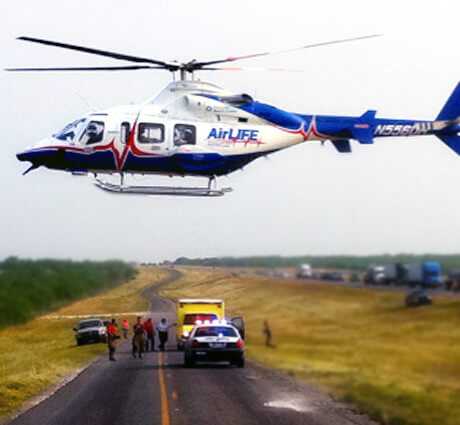A new research study in Bexar and surrounding counties will examine whether a drug already approved for slowing blood loss in other conditions will reduce the risk of death in adult trauma patients in shock from severe bleeding.
The Study of Tranexamic Acid during Air Medical Prehospital Transport Trial—or STAAMP Trial—is a national study designed to test the use of the drug in critically injured patients in shock during air transport to a trauma center.
University Hospital, AirLife and the Health Science Center will conduct the regional arm of the three-year study.
“Injury is the leading cause of death in people younger than age 45. Many of the deaths after trauma are due to bleeding. Between 30 percent and 50 percent of trauma patients with severe shock from bleeding die from their injuries,” said Dr. Brian Eastridge, professor of surgery at the UT Health Science Center and trauma medical director of University Hospital. “This important study will give us vital information as to whether tranexamic acid, given en route to a trauma center and in the trauma center, can reduce that unacceptably high mortality rate.”
Tranexamic acid, or TXA, is approved by the Food and Drug Administration to stem blood loss in patients undergoing heart surgery, orthopedic surgery and dental procedures. Recent studies involving wounded troops have shown that early use of TXA after arrival at a trauma center results in earlier control of bleeding and improved survival.
Patients who meet the criteria of the study will be randomly selected to get either TXA or saline. Currently, trauma patients in shock are typically treated by first responders with fluids, blood products or medicines that increase blood pressure en route to the hospital.
Because some seriously injured patients may not be able to provide consent to participate in the study, or may not have family members available to provide consent, the community is being notified to provide an opportunity for anyone wishing to be excluded from the study. Call (210) 743-4130 to receive a STAAMP opt-out bracelet in the mail to be excluded from participating.
Patients who MAY be entered in the study include those who:
- have severe injuries that require helicopter transport to University Hospital
- have been injured for two hours or less
- are in shock (low blood pressure and high heartbeat rate) before reaching the hospital
- are at least 18 years old
Patients who will NOT be in the study include those who:
- are wearing STAAMP opt-out bracelet
- are under age 18 or over age 90
- are known to be pregnant
- are known to be a prisoner
- have no intravenous access
- have certain types of injuries
- have no return of vital signs after CPR is performed for 5 minutes or more
Risks associated with TXA can include abdominal pain or discomfort, dizziness, fatigue, headache and allergic reaction. Post-operative seizures (abnormal electrical activity in the brain) may occur, but are unlikely because seizures are thought to be a result of larger amounts of TXA than will be given in the STAAMP study. Blood clots in the veins known as deep vein thrombosis and/or blood clots in the lungs known as pulmonary embolus are rare complications.
The study’s sponsors are the U.S. Department of Defense Telemedicine and Advanced Technology Research Center and the University of Pittsburgh.
For questions or more information about STAAMP, call 210-743-4130.


